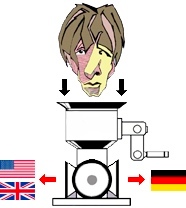German as the intermediary language: what would MT look like? Thread poster: Hans Lenting
|
|---|
Once upon a time, German was the lingua franca in engineering and science. What would the quality of MT be like today if German, rather than English, was used as the intermediary language?
After all, a language with grammatical cases, like German, can indicate relations between objects and actions much more precisely than a stack language like English.
And would languages with more grammatical cases (like Polish, Russian) lead to better MT results, if they were used as... See more Once upon a time, German was the lingua franca in engineering and science. What would the quality of MT be like today if German, rather than English, was used as the intermediary language?
After all, a language with grammatical cases, like German, can indicate relations between objects and actions much more precisely than a stack language like English.
And would languages with more grammatical cases (like Polish, Russian) lead to better MT results, if they were used as intermediary languages?
BTW: Does Yandex use Russian as intermediary language? ▲ Collapse
| | | | Lingua 5B 
Bosnia and Herzegovina
Local time: 16:56
Member (2009)
English to Croatian
+ ...
| Depends on the pair. | May 15, 2022 |
It’s about how well you train these machines, regardless of the language.
It also depends on the pair, assuming better results would come from two languages in the same family (eg. English and German, the same Germanic family), rather than English and Japanese, for instance.
| | | | Hans Lenting
Netherlands
Member (2006)
German to Dutch
TOPIC STARTER
Lingua 5B wrote:
It’s about how well you train these machines, regardless of the language.
It also depends on the pair, assuming better results would come from two languages in the same family (eg. English and German, the same Germanic family), rather than English and Japanese, for instance.
Any (language) system with more nuance, will lead to potentially better ways to precisely describe the world and what's happening there (and very likely to more complexity of the MT model).
German had the reputation of being the perfect language of Dichter und Denker at that time.
Your statement reminds me indeed of other factors:
- similarity of any two languages (so also between SL*) and IL/TL and IL)
- quality of training material
- volume of training material
- ...
*)SL: source language
IL: intermediary language
TL: target language
| | | | Jan Truper 
Germany
Local time: 16:56
Member (2016)
English to German
For MT (and also for human translation, by the way), German -> English would definitely be more precise than English -> German.
This does not only relate to grammatical cases. I translate a lot of dialogue, and one of the main reasons MT fails in this field arises from personal pronouns. "You" can be singular/plural/formal/informal in German (which has ramifications for the rest of the sentence). As a human, I am often able to derive from context or from commentary information who i... See more For MT (and also for human translation, by the way), German -> English would definitely be more precise than English -> German.
This does not only relate to grammatical cases. I translate a lot of dialogue, and one of the main reasons MT fails in this field arises from personal pronouns. "You" can be singular/plural/formal/informal in German (which has ramifications for the rest of the sentence). As a human, I am often able to derive from context or from commentary information who is talking to whom -- MT is all over the place.
[Edited at 2022-05-15 06:24 GMT] ▲ Collapse
| | |
|
|
|
Hans Lenting
Netherlands
Member (2006)
German to Dutch
TOPIC STARTER
Jan Truper wrote:
"You" can be singular/plural/formal/informal in German
That's what I meant with 'nuance' (in German). Perhaps not the ideal term to indicate this. How about 'specificness'?
"You" is a nice example. Thanks.
BTW: One would say that when some info isn't there in one language, MT cannot introduce it in the other language. But I've observed that MT actually does add additional info, because it's trained with HT of clever translators who have added necessary additional info for decades.
E.g.: I always find it surprising when MT adds (or repeats) an extra noun to make references clear. That almost looks like intelligence, but of course it's just statistics/mechanical pattern recognition.
On a side note: Just read the description 'Artificial Insanity' for AI this week . .
Does a better description model*) automatically lead to better descriptions? And how do you quantify 'better' in this context? More parameters?
*)HL or Human Language
[Edited at 2022-05-15 07:25 GMT]
| | | | To report site rules violations or get help, contact a site moderator: You can also contact site staff by submitting a support request » German as the intermediary language: what would MT look like? | Trados Studio 2022 Freelance | The leading translation software used by over 270,000 translators.
Designed with your feedback in mind, Trados Studio 2022 delivers an unrivalled, powerful desktop
and cloud solution, empowering you to work in the most efficient and cost-effective way.
More info » |
| | Trados Business Manager Lite | Create customer quotes and invoices from within Trados Studio
Trados Business Manager Lite helps to simplify and speed up some of the daily tasks, such as invoicing and reporting, associated with running your freelance translation business.
More info » |
|
| | | | X Sign in to your ProZ.com account... | | | | | |









